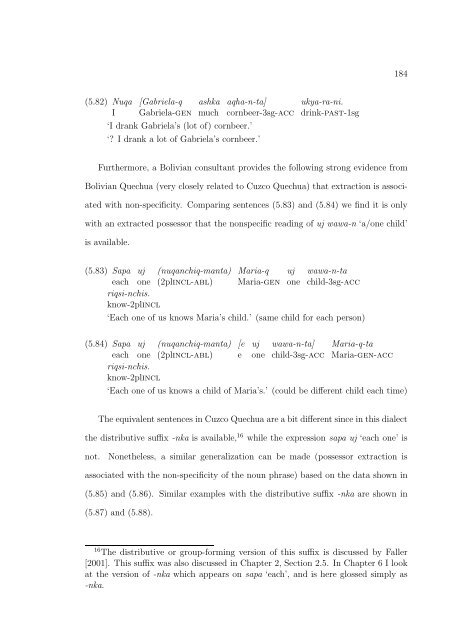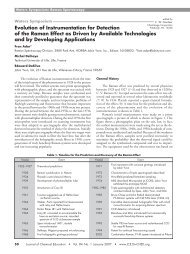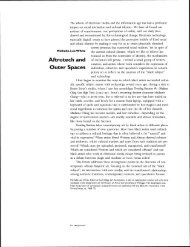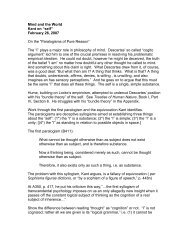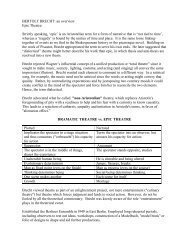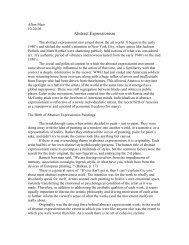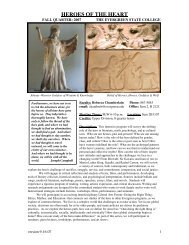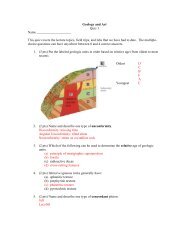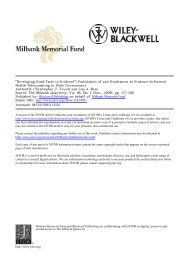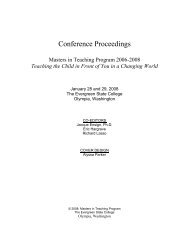- Page 1 and 2:
THE SYNTAX AND SEMANTICS OF RELATIV
- Page 3 and 4:
THE SYNTAX AND SEMANTICS OF RELATIV
- Page 5 and 6:
Biographical Sketch Rachel Hastings
- Page 7 and 8:
Acknowledgements When I entered the
- Page 9 and 10:
through valuable courses and commen
- Page 11 and 12:
I have also been the beneficiary of
- Page 13 and 14:
Table of Contents 1 Introduction 1
- Page 15 and 16:
5 Existential and Possessive Senten
- Page 17 and 18:
List of Abbreviations abl=ablative
- Page 19 and 20:
2 The most immediate puzzle of Quec
- Page 21 and 22:
4 the availability of slightly diff
- Page 23 and 24:
6 goal to the probe H. The detailed
- Page 25 and 26:
8 1.3 Background on Quechua This se
- Page 27 and 28:
10 1.3.2 Morphosyntax In this secti
- Page 29 and 30:
12 that complement clauses exhibit
- Page 31 and 32:
14 used is a combination of traditi
- Page 33 and 34:
16 tactically, it poses a challenge
- Page 35 and 36:
18 (2.4) DP ✟ ✟✟ ✟ ❍❍
- Page 37 and 38:
20 clause (specifically, she sugges
- Page 39 and 40:
22 2.2.3 Culy 1990 Culy [1990] prov
- Page 41 and 42:
24 To explain this phenomenon, Basi
- Page 43 and 44:
26 function g c assigns to the inde
- Page 45 and 46:
28 Since Quechua allows a great dea
- Page 47 and 48:
30 Table 2.1: Cuzco Quechua Quantif
- Page 49 and 50:
32 head. Furthermore, these sentenc
- Page 51 and 52:
34 basic syntactic analysis given h
- Page 53 and 54:
36 something about pisi which induc
- Page 55 and 56:
38 (2.41) LF head-raising in (2.40)
- Page 57 and 58:
40 (2.42) Kayne’s head-raising ap
- Page 59 and 60:
42 In general, other weak and stron
- Page 61 and 62:
44 as an example. This sentence is
- Page 63 and 64:
46 Note that the matrix clause dist
- Page 65 and 66:
48 some English consultants find th
- Page 67 and 68:
50 However, -nka may not appear on
- Page 69 and 70:
52 EHR sentence (2.61) is the stron
- Page 71 and 72:
Chapter 3 The Syntax of Head-Raisin
- Page 73 and 74:
56 Note that for a head-raising ana
- Page 75 and 76:
58 (3.7) Juan-pa wasi-n Juan-gen ho
- Page 77 and 78:
60 which show a subject internal he
- Page 79 and 80:
62 (3.26) [[Rumi stone riku-sqa-y]
- Page 81 and 82:
64 The tree in (3.30) shows the S-s
- Page 83 and 84:
66 Bianchi suggests that it is the
- Page 85 and 86:
68 This is the analysis given in [C
- Page 87 and 88:
70 (3.43) Mariya Maria Juan-ta Juan
- Page 89 and 90:
72 First (3.45) and (3.46) illustra
- Page 91 and 92:
74 (3.49) CP (3.47). TP ❍ ✟ ✟
- Page 93 and 94:
76 possibility is that the Case of
- Page 95 and 96:
78 sitions. The derivation of (3.51
- Page 97 and 98:
80 3.3.2.4 Why no -∅-marking in a
- Page 99 and 100:
82 the feature sets of each D are c
- Page 101 and 102:
84 (3.54) DP ✟ ❍❍ ✟ ✟✟
- Page 103 and 104:
86 Given the discussion thus far th
- Page 105 and 106:
88 (3.60) IP ❍ ❍ ❍ ❍ ❍
- Page 107 and 108:
90 reconstruction of the head (in t
- Page 109 and 110:
92 (3.66) [[naranja orange ch’arw
- Page 111 and 112:
94 (3.74) DP ✟ ❍❍ ✟ ✟✟
- Page 113 and 114:
96 (3.80) *[[pro pro [[e] e Lima-pi
- Page 115 and 116:
98 Despite the similarity in (3.83)
- Page 117 and 118:
100 Consider their examples (3.90)
- Page 119 and 120:
102 (3.95) *Santiyagu Santiago Xwan
- Page 121 and 122:
104 analysis presented here also pr
- Page 123 and 124:
106 Recall that Cuzco Quechua and I
- Page 125 and 126:
108 The cognate nominalizers -sqa (
- Page 127 and 128:
110 (4.7) [wayna-q boy-gen waka cow
- Page 129 and 130:
112 Furthermore, like CQ, IQ allows
- Page 131 and 132:
114 of possessor-noun agreement. Th
- Page 133 and 134:
116 (4.18) CP ✟ ✟✟✟ ❍ ❍
- Page 135 and 136:
118 (merged with n or v) to n or v
- Page 137 and 138:
120 and in the pattern of Case-mark
- Page 139 and 140:
122 4.4.1.4 Overt Case marking on a
- Page 141 and 142:
124 4.4.3 How the analysis explains
- Page 143 and 144:
126 Examples (4.32) to (4.39) show
- Page 145 and 146:
128 (4.40) *[[Marya Maria [warmi wo
- Page 147 and 148:
130 of (4.38) and (4.39). On the ot
- Page 149 and 150: 132 allowing an external interpreta
- Page 151 and 152: 134 4.5.3.1 Distribution of pro Sin
- Page 153 and 154: 136 (4.66) [[[e] Mishki-ta candy-ac
- Page 155 and 156: 138 Positive evidence that the exte
- Page 157 and 158: 140 For example, in a context which
- Page 159 and 160: 142 (4.83) DP ❍ ✟ ✟✟✟ ❍
- Page 161 and 162: 144 (4.85) and (4.86) are examples
- Page 163 and 164: 146 (4.93) [ñuka I wasi-*(pi) hous
- Page 165 and 166: 148 (4.97) Empty external head posi
- Page 167 and 168: Chapter 5 Existential and Possessiv
- Page 169 and 170: 5.2 The basic facts of Cuzco Quechu
- Page 171 and 172: 154 (5.9) Maria-q llama-n-kuna Mari
- Page 173 and 174: 156 position, or is kay more like E
- Page 175 and 176: 158 5.3.1 Quechua adverbial evidenc
- Page 177 and 178: 160 is agreeing in some default way
- Page 179 and 180: 162 5.3.2 Relative clause morpholog
- Page 181 and 182: 164 (5.37) Llaqta-y-pi ka-q/*ka-sqa
- Page 183 and 184: 166 5.3.3 The syntax of CQ existent
- Page 185 and 186: 168 (5.44) Initial view of the stru
- Page 187 and 188: 170 Adoption of the partitive Case
- Page 189 and 190: 172 In the following sections I wil
- Page 191 and 192: 174 According to Freeze, there is n
- Page 193 and 194: 176 (5.62) Mari-nak mari-dat van-na
- Page 195 and 196: 178 I will argue that the overt pre
- Page 197 and 198: 180 Although differing in some deta
- Page 199: 182 are typically either full DPs o
- Page 203 and 204: 186 of the preposition into the exi
- Page 205 and 206: 188 marking and with overt possesso
- Page 207 and 208: 190 (5.93) Pilar-pa mihuna wasi-n k
- Page 209 and 210: 192 (5.100) [[[Waka-q cow-gen uña-
- Page 211 and 212: Chapter 6 The Semantics of Disconti
- Page 213 and 214: 196 appear separated from the noun.
- Page 215 and 216: 198 The phenomenon I am considering
- Page 217 and 218: 200 Other quantifiers that appear D
- Page 219 and 220: 202 be associated to any element wi
- Page 221 and 222: 204 sample analysis for an instance
- Page 223 and 224: 206 6.3.2 Semantic effects of co-Ca
- Page 225 and 226: 208 (6.32) (a) [Ana-q pisi llama-n]
- Page 227 and 228: 210 Sánchez [1996] suggests that w
- Page 229 and 230: 212 Also striking in this regard ar
- Page 231 and 232: 214 configuration of a discontinuou
- Page 233 and 234: 216 from encoding definite DPs. In
- Page 235 and 236: 218 wasi ‘house’ can be extract
- Page 237 and 238: 220 the analysis I have outlined he
- Page 239 and 240: 222 in adjunct positions at all, an
- Page 241 and 242: 224 (6.59) Sapa 2 /*llapan/*tukuy [
- Page 243 and 244: 226 tants, but the intervening suff
- Page 245 and 246: 228 Without the intermediary level,
- Page 247 and 248: 230 Bittner, M. and K. Hale. 1995.
- Page 249 and 250: 232 Hastings, R. 2001. The interpre
- Page 251 and 252:
234 Muysken, P. 1989. Predication c


